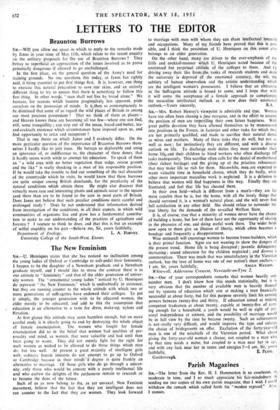LETTERS TO THE EDITOR
Braunton Burrows
Six.—Will you allow me space in which to reply to the remarks made by Janus in your issue of May I I th, which relate to the recent enquiry on the military proposals for The use of Braunton Burrows ? They ,betray so superficial an appreciation of the issues involved as to prove potentially dangerous if allowed to go unchallenged.
In the first place, on the general question of the Army's need for training grounds. No one questions this today, as Janus has rightly said, it being essential to put first things first. It is, however, one thing to exercise this natural precaution to save our skins, and an entirely different thing to try to ensure that there is something to follow this first thing. In other words, " man shall not live by bread alone." We humans, for reasons which become progressively less apparent, pride ourselves on the possessiqn of minds. Is ik then so contemptuously to be dismissed that some of us regard the wild places of Britain as among our most precious possessions ? That we think of them as places— and Heaven knows these are becoming all too few—where one can find, still, some tranquillity ; can step out of the mean, bread-and-butter, tea- and-cocktails existence which circumstances have imposed upon us, and find opportunity to relax and recuperate ?
That is one thesis on which Janus and I evidently differ. On the more particular question of the importance of Braunton Burrows them- selves I hardly like to join issue. He betrays so deplorable and smug an ignorance of, or indifference to, the character of these dunes, that it hardly seems worth while to attempt his education. To speak of them as " a wild area with no better vegetation than sedge, coarse grasses and the like" is really shocking in a man of his responsible position. If he would take the trouble to find out something of the real character of the countryside which he visits, he would know that these burrows are quite unique among British dunelands, for the peculiarity of the natural conditions which obtain there. He might also discover that virtually more rare and interesting plants and animals occur to the square yard there than are to be found to the acre in most parts of Britain. Does Janus not believe that such peculiar conditions merit careful and prolonged study ? Does he not understand that information derived from investigation of the conditions, in all their aspects, in which wild communities of organisms live and grow has a fundamental contribu- tion to make to our understanding of the practices of agriculture and forestry ? I venture to think he does, and that this is but an example of wilful stupidity on his part —Believe me, Sir, yours faithfully, Department of Zoology. L A. HARVEY. University College of the South-West. Exeter.






































 Previous page
Previous page